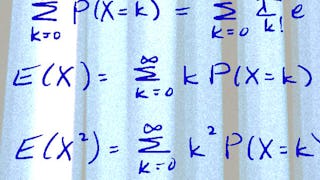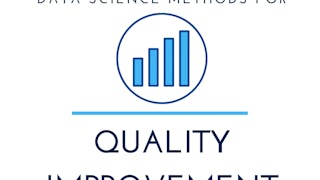Comprenez les fondements des probabilités et leur relation avec les statistiques et la science des données. Nous apprendrons ce que signifie calculer une probabilité, les résultats indépendants et dépendants, et les événements conditionnels. Nous étudierons les variables aléatoires discrètes et continues et verrons comment elles s'intègrent dans la collecte de données. Nous terminerons le cours avec les variables aléatoires gaussiennes (normales) et le théorème de la limite centrale et comprendrons son importance fondamentale pour toutes les statistiques et la science des données. Ce cours peut être suivi pour un crédit académique dans le cadre du Master of Science in Data Science (MS-DS) de CU Boulder offert sur la plate-forme Coursera. Le MS-DS est un diplôme interdisciplinaire qui réunit des professeurs des départements de mathématiques appliquées, d'informatique, de sciences de l'information et d'autres départements du CU Boulder. Avec des admissions basées sur la performance et aucun processus de candidature, le MS-DS est idéal pour les personnes ayant un large éventail d'études de premier cycle et / ou d'expérience professionnelle en informatique, en sciences de l'information, en mathématiques et en statistiques. Pour en savoir plus sur le programme MS-DS, consultez le site https://www.coursera.org/degrees/master-of-science-data-science-boulder Logo adapté d'une photo de Christopher Burns sur Unsplash.



Théorie des probabilités : Fondation pour la science des données
Ce cours fait partie de Spécialisation Fondements de la science des données : Inférence statistique


Instructeurs : Anne Dougherty
29 564 déjà inscrits
Inclus avec 
(246 avis)
Expérience recommandée
Ce que vous apprendrez
Expliquez pourquoi les probabilités sont importantes pour les statistiques et la science des données.
Voir la relation entre les événements conditionnels et indépendants dans une expérience statistique.
Calculez l'espérance et la variance de plusieurs variables aléatoires et développez une certaine intuition.
Compétences que vous acquerrez
- Catégorie : Probabilités et statistiques
- Catégorie : Distribution de probabilité
- Catégorie : Statistiques Générales
- Catégorie : Mathématiques
Détails à connaître

Ajouter à votre profil LinkedIn
6 devoirs
Découvrez comment les employés des entreprises prestigieuses maîtrisent des compétences recherchées

Élaborez votre expertise du sujet
- Apprenez de nouveaux concepts auprès d'experts du secteur
- Acquérez une compréhension de base d'un sujet ou d'un outil
- Développez des compétences professionnelles avec des projets pratiques
- Obtenez un certificat professionnel partageable


Obtenez un certificat professionnel
Ajoutez cette qualification à votre profil LinkedIn ou à votre CV
Partagez-le sur les réseaux sociaux et dans votre évaluation de performance

Il y a 7 modules dans ce cours
Bienvenue au cours ! Ce module contient des informations logistiques pour vous aider à démarrer !
Inclus
3 lectures1 sujet de discussion1 laboratoire non noté
Comprenez les fondements des probabilités et leur relation avec les statistiques et la science des données. Nous apprendrons ce que signifie calculer une probabilité, les résultats indépendants et dépendants, et les événements conditionnels. Nous étudierons les variables aléatoires discrètes et continues et verrons comment elles s'intègrent dans la collecte de données. Nous terminerons le cours avec les variables aléatoires gaussiennes (normales) et le théorème de la limite centrale, et nous comprendrons son importance fondamentale pour l'ensemble des statistiques et de la science des données.
Inclus
3 vidéos2 lectures1 devoir1 devoir de programmation1 laboratoire non noté
La notion de "probabilité conditionnelle" est un concept très utile de la théorie des probabilités et, dans ce module, nous introduisons l'idée de "conditionnement" et la formule de Bayes. Le concept fondamental d'"événement indépendant" découle alors naturellement de la notion de conditionnement. Les événements conditionnels et indépendants sont des concepts fondamentaux pour comprendre les résultats statistiques.
Inclus
2 vidéos1 lecture1 devoir1 devoir de programmation1 laboratoire non noté
Le concept de "variable aléatoire" (v.a.) est fondamental et souvent utilisé en statistique. Dans ce module, nous étudierons diverses variables aléatoires discrètes. Nous apprendrons certaines de leurs propriétés et pourquoi elles sont importantes. Nous calculerons également l'espérance et la variance de ces variables aléatoires.
Inclus
4 vidéos1 lecture1 devoir1 devoir de programmation1 laboratoire non noté
Dans ce module, nous étendrons notre définition des variables aléatoires pour y inclure les variables aléatoires continues. Les concepts de ce module sont cruciaux car une grande partie des statistiques traite de l'analyse des variables aléatoires continues. Nous commencerons par les variables aléatoires uniformes et exponentielles, puis nous étudierons les variables aléatoires gaussiennes, ou normales.
Inclus
4 vidéos2 lectures1 devoir1 devoir de programmation1 laboratoire non noté
La puissance des statistiques réside dans la possibilité d'étudier les résultats et les effets de multiples variables aléatoires (parfois appelées "données"). Ainsi, dans ce module, nous apprendrons le concept de "distribution conjointe" qui nous permet de généraliser la théorie des probabilités au cas multivarié.
Inclus
3 vidéos1 lecture1 devoir1 devoir de programmation
Le théorème de la limite centrale (CLT) est un résultat crucial utilisé dans l'analyse des données. Dans ce module, nous présenterons le CLT et ses applications telles que la caractérisation de la distribution de la moyenne d'un grand ensemble de données. Cela préparera le terrain pour le cours suivant.
Inclus
2 vidéos1 lecture1 devoir1 devoir de programmation1 laboratoire non noté
Instructeurs


Offert par
Recommandé si vous êtes intéressé(e) par Probabilités et Statistiques


University of Colorado Boulder


University of Colorado Boulder
Préparer un diplôme
Ce site cours fait partie du (des) programme(s) diplômant(s) suivant(s) proposé(s) par University of Colorado Boulder. Si vous êtes admis et que vous vous inscrivez, les cours que vous avez suivis peuvent compter pour l'apprentissage de votre diplôme et vos progrès peuvent être transférés avec vous.¹
Pour quelles raisons les étudiants sur Coursera nous choisissent-ils pour leur carrière ?




Avis des étudiants
246 avis
- 5 stars
77,64 %
- 4 stars
10,56 %
- 3 stars
3,65 %
- 2 stars
1,62 %
- 1 star
6,50 %
Affichage de 3 sur 246
Révisé le 2 juin 2024
Thank you to everyone who put a lot of effort into making this course; it is really helpful.
Révisé le 4 mars 2023
This course taught me the basics of probability, R programming, and Latex. I am deeply grateful to Prof. Anne Dougherty, UC Boulder, and Coursera for this tough but wonderful experience.
Révisé le 21 juil. 2024
Very well presented material with invaluable and illuminating labs, quizes, and programming assignments. I felt like the pace and assignment difficulty were perfect.

Ouvrez de nouvelles portes avec Coursera Plus
Accès illimité à 10,000+ cours de niveau international, projets pratiques et programmes de certification prêts à l'emploi - tous inclus dans votre abonnement.
Faites progresser votre carrière avec un diplôme en ligne
Obtenez un diplôme auprès d’universités de renommée mondiale - 100 % en ligne
Rejoignez plus de 3 400 entreprises mondiales qui ont choisi Coursera pour les affaires
Améliorez les compétences de vos employés pour exceller dans l’économie numérique
Foire Aux Questions
L'accès aux cours et aux devoirs dépend de votre type d'inscription. Si vous suivez un cours en mode audit, vous pourrez consulter gratuitement la plupart des supports de cours. Pour accéder aux devoirs notés et obtenir un certificat, vous devrez acheter l'expérience de certificat, pendant ou après votre audit. Si vous ne voyez pas l'option d'audit :
Il se peut que le cours ne propose pas d'option d'audit. Vous pouvez essayer un essai gratuit ou demander une aide financière.
Le cours peut proposer l'option "Cours complet, pas de certificat" à la place. Cette option vous permet de consulter tous les supports de cours, de soumettre les évaluations requises et d'obtenir une note finale. Cela signifie également que vous ne pourrez pas acheter un certificat d'expérience.
Lorsque vous vous inscrivez au cours, vous avez accès à tous les cours de la Specializations, et vous obtenez un certificat lorsque vous terminez le travail. Votre certificat électronique sera ajouté à votre page de réalisations - de là, vous pouvez imprimer votre certificat ou l'ajouter à votre profil LinkedIn. Si vous souhaitez uniquement lire et visualiser le contenu du cours, vous pouvez auditer le cours gratuitement.
Si vous vous êtes abonné, vous bénéficiez d'une période d'essai gratuite de 7 jours pendant laquelle vous pouvez annuler votre abonnement sans pénalité. Après cette période, nous ne remboursons pas, mais vous pouvez résilier votre abonnement à tout moment. Consultez notre politique de remboursement complète.






